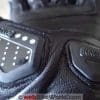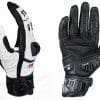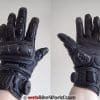The Knox Orsa gloves are cool and comfortable for summer, with all the protective features you’d expect from Knox. They’re CE certified to EN13594:2012 for everything from Design and Construction to the pH value of the leather. The certification also includes abrasion resistance; impact resistance with the Knox SPS system and tear and seam strength.
The Boa lacing system ensures a snug and comfortable fit and the goat hide leather is soft and pliable. Specially perforated leather (to meet the CE standard) helps keep the Orsa gloves ventilated. Summer is often a time when the safety versus comfort equation comes down on the side of comfort.
Since getting hot and sweaty in your gear reduces concentration and increases bad temper and impatience, overheating is a potential safety hazard. But so is riding without adequate protection. Hot weather gloves in mesh, light textile or perforated leather let air through to your hands, but can feel a little flimsy in comparison with thicker winter wear. Knox’s Orsa summer gloves, by contrast, feel totally secure — but are they cool enough?
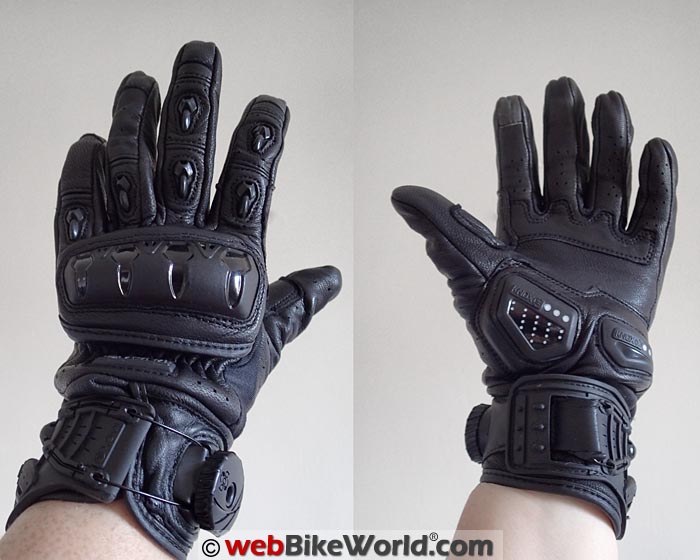
First Impressions
Knox kindly sent me a pair of Orsa gloves to review, and they arrived in their own branded cloth drawstring bag.
In my experience, this is typical of the service you receive if you order direct from the Cumbria, UK-based manufacturer.
The first thing I noticed was how lovely they smelled.
Now, I’m no leather fetishist, but there’s a distinct whiff of high end shoe shop when you stick your nose in the glove, which made me feel that top quality materials were involved.
Appearance
Black. BLACK! The only splash of colour on these gloves is a few white dots on the scaphoid protectors. (NB: the Orsa gloves currently pictured on Knox’s website are slightly more colourful.)
They are also, as witty souls continue to scrawl on dusty vehicles, available in white.
The Knox logo is small and subtle, consisting of a black rubber tab on the back of the wrist.
Although the knuckle protectors do stand out, the Orsa aren’t styled like racing gloves; the ethos is definitely “street style with a little extra protection”.
These gloves won’t raise any eyebrows on a casual glance, but take a closer look and they’re packed with nifty features.
Construction
The outer shell, according to the label, is 91% goat leather, 5% cow leather, and 4% nylon.
The end result is a soft and supple glove that feels thick enough for protection while allowing good feel and airflow.
Neat rows of single stitching — double around the areas which have a second layer of leather — hold the glove together, with a zigzag gather at the wrist.
There’s a thin, smooth lining of 100% polyester, which makes these more comfortable than an unlined glove, and easier to pull on and off.
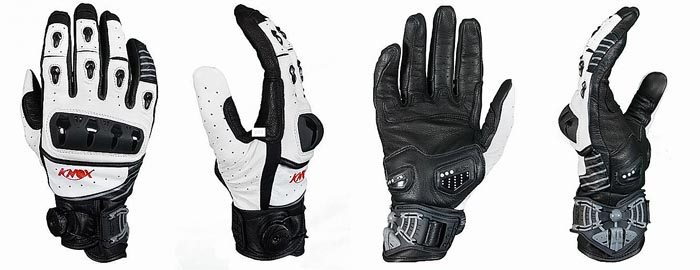
Fit and Features
I requested a size Small, which turned out to be a great fit at fingers, hand and wrist.
There’s more space than I need in the end of the little finger, but it’s best to err on the side of too long for that one.
Because my wrists are fairly skinny, when the closure is tightened there is a slight bulge above it where the leather bunches up.
I was concerned that this would be uncomfortable, and that it wouldn’t fit under my jacket sleeve, but on the bike I had no problems.
The gloves are highly flexible, thanks to the softness of the leather.
There’s also a gap in the leather at the middle joint of each finger, and, on the index and middle fingers, at the top joint too. These, plus the “floating knuckle” protector on the back, allow freedom of movement in the hand and fingers.
The knuckle protector and the areas of reinforced leather at the base of the palm and base of the fingers are backed with a layer of memory foam for increased comfort.
The fingertips have wraparound seams, and, as a neat little bonus, the tip of the index finger on both the left and right hands is made from touchscreen-sensitive material, so you can operate a sat-nav or smartphone without taking your gloves off.
The overall feel is so good that I typed this sentence with the gloves on, though I wouldn’t fancy writing the whole review this way.
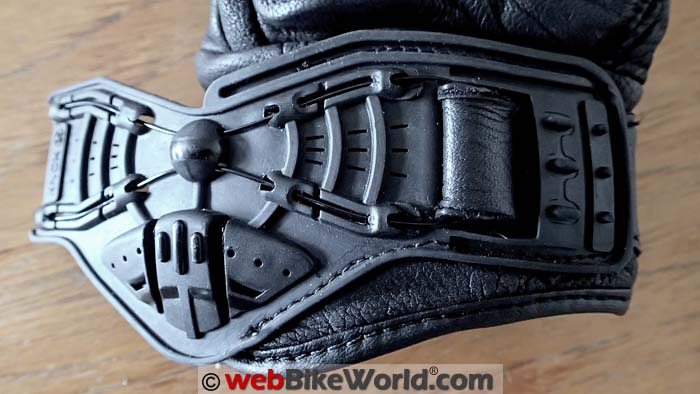
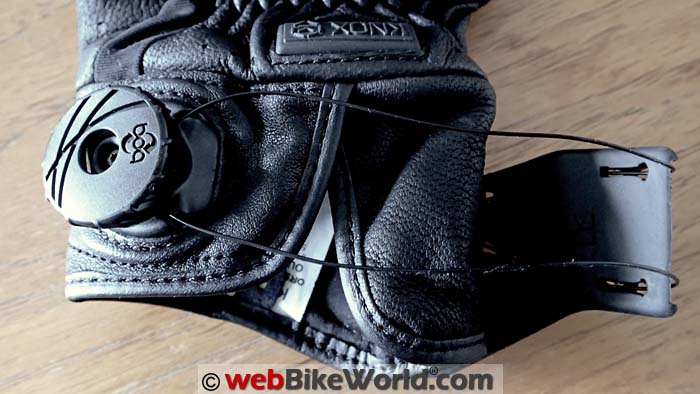
Ventilation
Ventilation is provided by perforations in the leather. These cover the whole back of the glove, as well as the sides and undersides of the fingers.
The knuckle protector means that a biggish area on the back isn’t perforated, but there are three vents in the front of the protector itself.
The gaps in the leather at the finger joints, along with a strip a centimetre or so wide between the back of the hand and the thumb, expose the lining, allowing air to pass through.
On the Road
I must admit, I spent quite a lot of time playing with the gloves before I actually wore them on the bike.
I’d put them on, tighten the Boa closure (of which more later), then release the fastening again, rather like Eeyore repeatedly putting his birthday balloon in his birthday honeypot so he could then take it out.
The first time I rode in the Orsa gloves, I found them surprisingly stiff given the flexibility I’d noted when I was simply wearing them around the house.
After a couple of trips, though, the memory foam must have done its stuff.
Broken in, the gloves are very comfortable, and my first long ride, a journey of around 150 miles, was a pleasure.
As for keeping cool, you can’t actually feel the air blasting over your hands, but the perforations do their job.
On the only really hot day I’ve ridden through this year, my hands stayed at a pleasant temperature in town, on the open road, and at motorway speeds.
Not too hot, not too cold, not sweaty at all; I found the level of ventilation perfect for anything above walking pace.
Being summer gloves, these aren’t waterproof and I’d advise taking a second pair of gloves along in case you get caught in a shower.
But because I never take my own advice, I can report that the Orsas feel pretty comfortable even when soaking wet.
They don’t retain water in the way that a glove with a thicker lining would, so they didn’t become a soggy, heavy mess when I got caught in a downpour. They pulled off, and back on again, easily, thanks to the lining.
I expected my hands to be purple all over when I finally removed the gloves, but to my surprise the dye stayed firmly in the leather with the exception of a distinct line around each finger and one around the base of the thumb, along the internal seams.
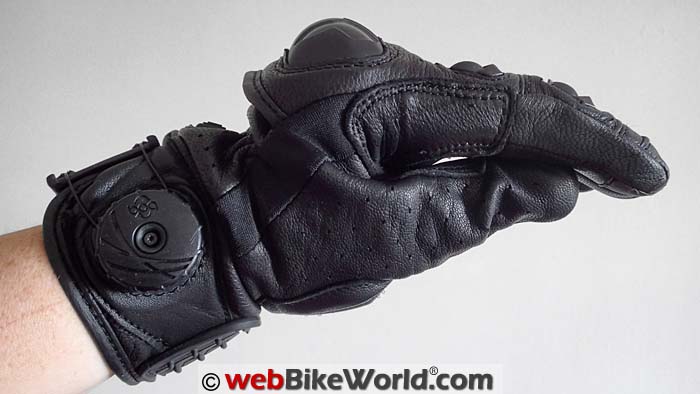
Protection
The Knox Ora gloves meet the European safety standard (CE) prEN 13594 – 2012, “Protective gloves for motorcycle riders.
Requirements and test methods”, having passed 15 tests covering everything from material content to seam strength, cut and tear resistance, and impact resistance.
I certainly feel safe in them.
The most noticeable safety feature is the protector across the back of the knuckles. This consists, according to Knox’s website, of gel with a honeycomb structure for strength, enclosed in a plastic shell.
This area is “floating”; it’s not attached to the glove at the back, so it’s still easy to clench your fist. Memory foam backing keeps it comfortable.
There are smaller plastic protectors on the back of each finger: two on the index and middle fingers, just one at the base of the ring and little finger. These are abrasion-resistant and designed to slide in a crash.
The base of the palm and the base of the fingers have a double layer of leather, again backed with memory foam. These prevent everyday wear and tear as well as adding slide protection, while keeping hands comfortable on the grips.
There’s also an extra panel running between the thumb and index finger, just where the gloves are likely to rub when holding the bars.
The Orsa gloves may not have the futuristic Bladerunner aesthetic of Knox’s hallmark Handroid gloves (review) and the short cuff Handroid Pod, but they do offer many of the same features, including two patented protection systems.
These are important enough to merit their own sections.
Boa Closure System
The Boa closure system (first described in the Knox Handroid gloves review, along with a video), which is used in sports and medical applications, amongst others, uses coated, aircraft grade steel laces which are tightened using a reel.
The laces travel along guides to give an even tightness all round, with security where it’s needed. In the case of the Orsa gloves, the system consists of a complicated-looking rubber cuff threaded with wires.
An extra protector is incorporated in the rubber part, and sits over what Wikipedia informs me is the styloid process of the ulna (a.k.a. the bony bit that sticks out on the outside of your wrist).
To fasten the gloves, simply press the knob on the inside of the wrist and turn the dial. The laces tighten with a series of tiny clicks, and are locked in position when you stop turning.
You can achieve the precise degree of tightness you want, making Boa’s claim of a “dial in fit” entirely justified.
A quick release means that the closure slackens with a pull on the knob, instantly becoming loose enough for you to pull the glove off without further adjustment.
That’s all very well, but how is it for everyday, practical use? Very good, is my answer.
It takes about three seconds to tighten the closure; not significantly longer, if at all, than dealing with two hook-and-loop straps.
The chunky knob with its knurled edge is easy to operate even when one glove is on. Once in place, the fastening is secure and unnoticeable. It doesn’t chafe or move around on the wrist, and it certainly won’t come undone.
The glove will slide forward along the wrist a little way with a hard pull, but there was no way to force it over the hand and off.
I was concerned the knob wouldn’t fit under the cuff of my bike jacket, but Knox have thought of this, and it tucks away nicely. At the end of the journey, it’s the work of a moment to release the fastening and remove the glove.
The system even comes with a lifetime guarantee.
The Boa Lacing System was not developed by Knox; it’s a system licensed from Boa Technology.
Boa headquarters are located in Steamboat Springs, Colorado and the closure system, which is a high-tech substitute for Velcro and shoelaces, was first developed for snowboarding.
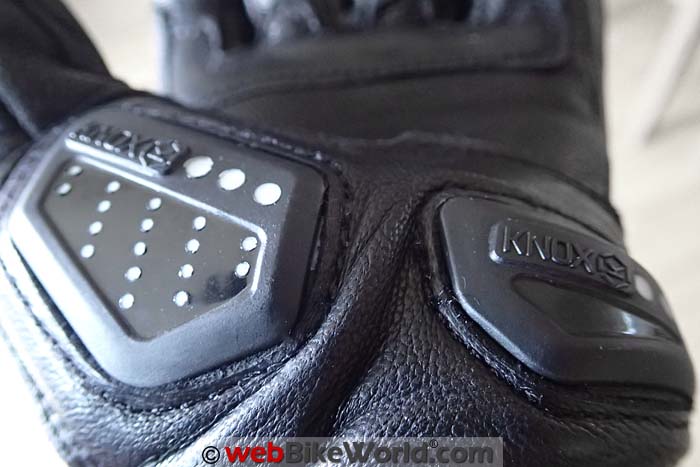
Knox SPS
The Knox SPS, or Scaphoid Protection System, is also used on other Knox gloves. Injuries to the scaphoid, one of the carpal bones in the wrist, are very common in motorcycling.
The scaphoid can be fractured when a fall is broken by the palm of the hand, either by compression — force applied to the palm — or by hyperextension, when the hand stops moving but the rest of the body keeps going.
Given that the instinctive reaction during an off is to protect ourselves by putting our hands down, it’s easy to see how these injuries happen, especially when leather palms grip the tarmac, slowing the hand and arm.
Since a scaphoid fracture can mean weeks or months off the bike, and often discomfort while riding for some time after that, it’s in the rider’s interest to avoid it.
Patented in 2006, Knox’s scaphoid protection system (SPS) consists of two pads at the base of the thumb and the heel of the hand.
The low friction design allows the hand to slide when it makes contact with the road, rather than gripping. The system was first used in motorcycle racing, but has now been incorporated into gloves designed for leisure riding.
I find I am slightly aware of the raised pads while I’m riding, but they’re not uncomfortable. In fact, it’s reassuring to know they’re there.
Conclusion
While the Knox Orsa gloves may not be the ultimate in ventilation (mesh construction is always going to win out over perforated leather), they have kept my hands comfortable in the highest temperatures the UK has managed to throw at me this year.
And I’m confident they will do the same if I take them to hotter climes.
Unlike mesh gloves, these are comfortable all summer long (except when it rains).
So rather than only coming out on the really scorching days, and I’m confident that the protection offered is more than adequate.
There are cheaper summer gloves, but for all the comfort and features these ones offer, I’m impressed that they come in at £79.95 ($119.95 in the US).
Note that there’s also a motocross version, the Knox Orsa MX gloves, which list for £69.95 ($89.95 US).
Owner Comments and Feedback
See details on submitting comments.
From “K” (April 2017): “I’ve been a keen fan of wBW for a while, and I look forward to your reviews. I recently purchased the Knox Orsa based on your reviews, and sadly I get some slight numbness while using the gloves.
The fit is just right but somehow, the palm area below the pinky seems to get numb.
What i love about the Orsa is the seamless stitching near the fingertips, that was one of the reasons I decided to get the Orsa. It’s an extremely well made glove, but I really regret that the numbness and occasional pain don’t seem to go away after about 30 minutes of riding.
I previously used the REV’IT! Dirt 2, and the comfort level is really high and I don’t get the above problems, except my fingertips hurt due to the seams on the index finger.
My concerns are basically the palm area (I’m riding a BMW R1200GS LC) which seems to need a bit of padding and clean seamless fingertips.
I also purchased the Grip Buddies but that also caused numbness so I took it off.
I read with interest now the IXS Vidar gloves (review) or the REV’IT! Cayenne Pro gloves (review), and may wish to spring for either of these two.
Can you suggest why my palm have these numbness with the Orsa ? I So desperately want to love it. Big fan here, and keep up the good work!”
Editor’s Reply: I occasionally hear about an issue with numbness and gloves, it’s usually something to do with the geometry of the handlebar, the grip and the way the glove presses on the nerves.
It’s difficult to purchase gloves because even if you try them on in a shop, sometimes you don’t know what will happen once you get out on the bike.
And there are so many nerves in the hands, a little thing can cause a big problem.
I have a really nice pair of expensive gloves of an old brand and I have the same problem, I can’t wear them because something about the way their cut just doesn’t work with my hand position on any bike I’ve tried so far.
With some gloves, sometimes the problem will become resolved when the gloves are broken in, but you can never tell.
So there’s probably only 3 things you can do:
1. Try to determine where the gloves are pressing on a nerve that is causing the problem, then perhaps try to determine if the gloves are broken in differently, maybe the pressure will be released?
2. Perhaps you can return these for a different size or type or brand?
3. Also, maybe contact Knox and see if they can help? Good luck!
From “E.Z.” (July 2016): “I’d been looking for some summer short gloves for a while, and the Mk.II Orsa gloves were released just before I went to pick up my order of the Mk.I Orsa!
Touchscreen compatibility was something I had been looking for but could not find in a pair of summer gloves with scaphoid protection, so I swapped my order just in time.
The Orsa gloves are nicely comfortable (my first gloves with the Boa laces) and well ventilated.
The only improvements I’d like to see would be additional touchpads on the thumbs to go with the index fingers, as many devices now have touch input actions that require multiple fingers to use (e.g. zooming and rotating).
And some armour added to the outside of the pinky and/or side of the hand, which are currently bare leather.
Hopefully Knox update their line of waterproof gloves to add touchscreen fingertips before it starts getting cold this year!”
From “G.W.” (July 2016): “I have started to realize the importance of palm sliders and palm impact protection on motorcycle gloves. This is an area that I feel frequently gets overlooked by glove manufacturers.
My enlightenment came after a motorcycle crash in which I broke my wrist when I landed on my palm at ~40mph. At this speed your palm, unless your glove has sliders in this area, grips the pavement increasing the force of the jolt.
More impact protection in this area would probably be a good thing too.
It is nice to see glove manufacturers like Knox at least start to take palm protection seriously.”


